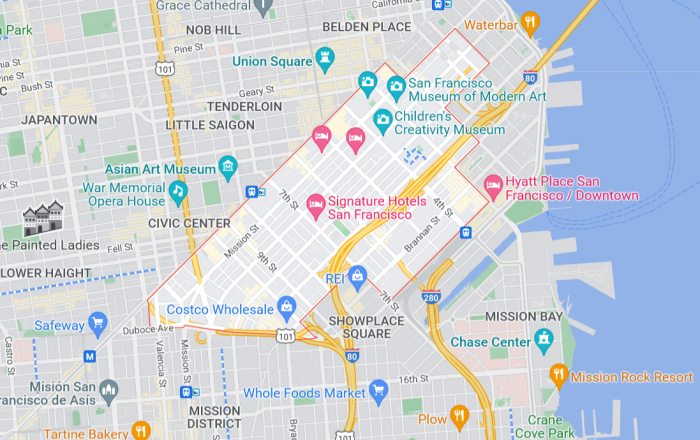SoMa: Difference between revisions
No edit summary |
|||
| Line 4: | Line 4: | ||
<br> | <br> | ||
== Reserve #2 == | == Reserve #2 == | ||
The city’s second M-T Sector is in SoMa, short for | |||
South of Market (Street), which runs along the northwestern | |||
side. The sector also borders 2nd and 8th streets to the | |||
northeast and southwest and Brannan to the northwest and | |||
southeast. It includes the Greyhound bus station, Moscone | |||
Convention Center and many hotels, theaters and other | |||
amusements to keep potential vessels passing through. | |||
Historically, the SoMa neighborhood was industrial | |||
rather than residential, and its history manifests in the | |||
building facades along its streets. Unlike the Victorian | |||
row houses characterizing most other San Francisco | |||
neighborhoods, SoMa’ s streets are cluttered by enormous, | |||
featureless warehouses and rehabbed factory buildings. | |||
While SoMa hasn’t actually been an industrial area in | |||
decades, it still maintains that feel. In recent years, many | |||
of the district’s buildings became nightclubs, sex clubs | |||
and offices for the dot-com boom. Since the Internet | |||
frenzy went bust, however, many of these buildings sit | |||
vacant, providing fertile incubating grounds for the city’s | |||
social ills: drug manufacture and distribution, snuff film | |||
production and assorted gang-related crimes. | |||
---- | ---- | ||
---- | ---- | ||
Revision as of 23:45, 14 July 2022
Reserve #2
The city’s second M-T Sector is in SoMa, short for South of Market (Street), which runs along the northwestern side. The sector also borders 2nd and 8th streets to the northeast and southwest and Brannan to the northwest and southeast. It includes the Greyhound bus station, Moscone Convention Center and many hotels, theaters and other amusements to keep potential vessels passing through.
Historically, the SoMa neighborhood was industrial rather than residential, and its history manifests in the building facades along its streets. Unlike the Victorian row houses characterizing most other San Francisco neighborhoods, SoMa’ s streets are cluttered by enormous, featureless warehouses and rehabbed factory buildings.
While SoMa hasn’t actually been an industrial area in decades, it still maintains that feel. In recent years, many
of the district’s buildings became nightclubs, sex clubs and offices for the dot-com boom. Since the Internet frenzy went bust, however, many of these buildings sit vacant, providing fertile incubating grounds for the city’s social ills: drug manufacture and distribution, snuff film production and assorted gang-related crimes.
